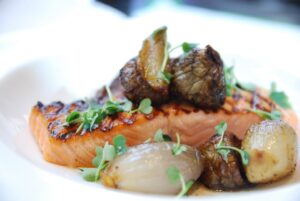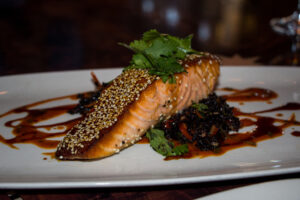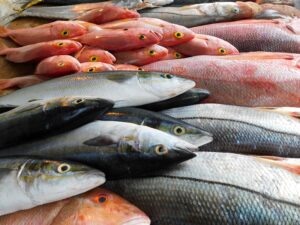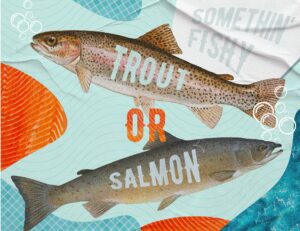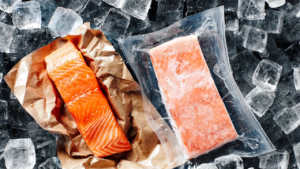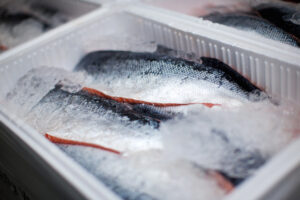Eating a balanced diet during pregnancy is crucial for the health of both you and your growing baby. Among the many food choices, salmon often stands out as a nutritional superstar. However, it’s not without its cautions. In this article, we will delve into the safety of consuming salmon during pregnancy, addressing questions such as: Can I eat salmon while pregnant? Can I eat raw salmon during pregnancy? Is it safe to eat salmon sushi while pregnant? Can I have smoked salmon during pregnancy? Let’s explore the facts and guidelines to make wise choices during this critical period.
Nutritional Value of Eating Salmon During Pregnancy
Pregnancy is a transformative period where your body’s nutritional needs significantly increase to support the optimal development of both your own health and your growing baby. This is where salmon shines as a nutritional superstar, providing a wide range of essential nutrients crucial for a healthy pregnancy.
Rich in Omega-3 Fatty Acids:
One of the standout features of salmon is its high content of omega-3 fatty acids, particularly docosahexaenoic acid (DHA) and eicosapentaenoic acid (EPA). These essential fatty acids are vital during pregnancy as they contribute to the development of your baby’s brain, nervous system, and eyes. DHA, in particular, is a crucial component of brain cell membranes, essential for cognitive function and neural development.
High-Quality Protein:
Protein is the building block of life, and during pregnancy, your body requires extra protein to support the growth and development of your baby. Salmon is an excellent source of high-quality protein, providing the amino acids necessary for your baby’s cell, tissue, and organ formation. Additionally, when your body undergoes significant changes, protein helps maintain your own muscle and tissue health.
Vitamins and Minerals:
Salmon is rich in essential vitamins and minerals vital for overall health during pregnancy. It’s a good source of B-vitamins, including B6, B12, and niacin, which are important for energy metabolism and red blood cell formation. Salmon also contains vitamin D, crucial for calcium absorption and the development of your baby’s bones and teeth.
Salmon is abundant in minerals like selenium, potassium, and phosphorus. Selenium, in particular, can protect body cells from damage and support your baby’s growth. Potassium is essential for maintaining proper fluid balance, nerve function, and muscle contractions, all of which are crucial during pregnancy. Phosphorus contributes to the formation and maintenance of strong bones and teeth for both you and your baby.
Low Saturated Fat Content:
While salmon is rich in beneficial fats, its saturated fat content is notably low. This is an important consideration during pregnancy, as a high-saturated-fat diet can increase the risk of conditions like gestational diabetes and other complications. The healthy fat content of salmon makes it an ideal choice for maintaining cardiovascular health and overall well-being during pregnancy.
Anti-Inflammatory Properties:
In addition to its nutritional profile, salmon also possesses anti-inflammatory properties due to its omega-3 fatty acids. Inflammation is a natural body response, but excessive or chronic inflammation can be harmful and may lead to various health issues. Omega-3 fatty acids in salmon help combat inflammation, reducing the risk of inflammation-related issues for both you and your baby.
Easy Digestion and Absorption:
Salmon is known for being easy to digest and having high bioavailability of nutrients. During pregnancy, when your digestive system may slow down, choosing foods that are gentle on the stomach and easily absorbed can be particularly beneficial.
To learn more about the nutritional information of salmon, please click to read this article.
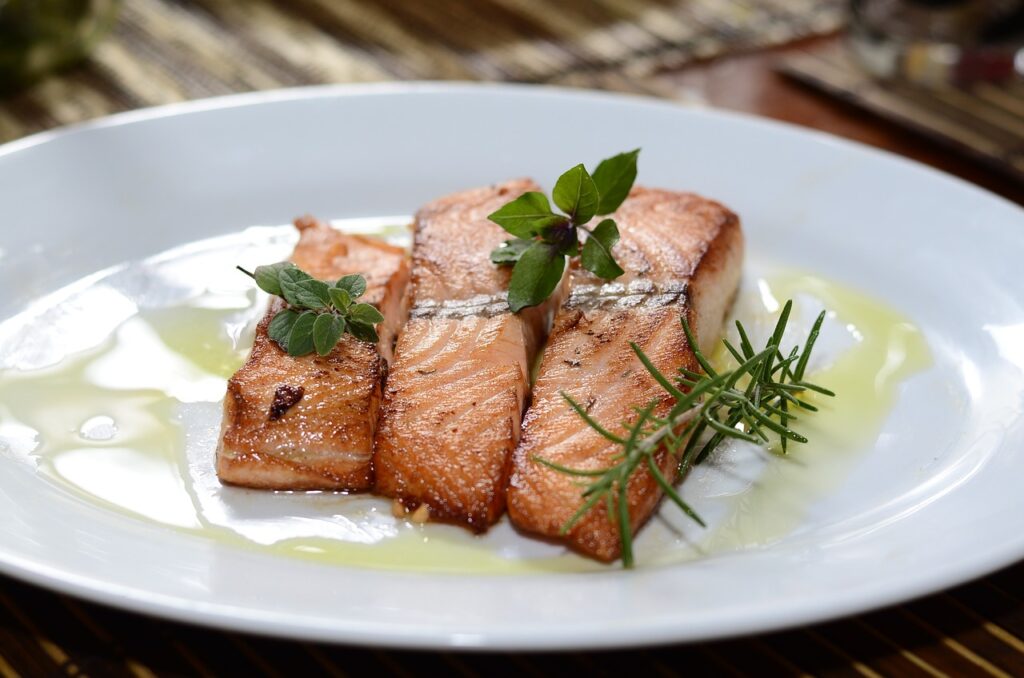
Can I Eat Salmon During Pregnancy?
When it comes to dietary choices during pregnancy, salmon is a highly nutritious option that you can safely incorporate into your diet. However, there are some basic guidelines and precautions to ensure that consuming salmon is a healthy choice for both you and your developing baby.
Safe Cooking of Salmon
While salmon is highly beneficial, it must be prepared safely to avoid potential risks. Pregnant women, like everyone else, should ensure that salmon is cooked thoroughly to eliminate any potential foodborne pathogens. This means that the internal temperature of salmon should reach at least 145°F (63°C) to be considered safe for consumption. Properly cooking salmon not only ensures your safety but also enhances its flavor and texture.
Fresh vs. Frozen Salmon
Whether you choose fresh or frozen salmon depends on personal preference and availability. Both options are nutritious and safe when purchased from reputable sources. Fresh salmon is advantageous for immediate use, while frozen salmon is convenient for long-term storage and is often more readily available. When selecting salmon, it’s essential to consider its quality, source, and any added preservatives.
Can I Eat Raw Salmon During Pregnancy?
The allure of sushi and sashimi can be hard to resist, but when you’re pregnant, the safety of consuming raw salmon becomes a paramount concern. Eating raw salmon, like other raw or undercooked seafood, carries certain risks that could impact both you and your developing baby. Let’s delve into the reasons behind this caution and explore safe alternatives to satisfy your sushi cravings during pregnancy.
Risks of Eating Raw Salmon
Consuming raw salmon, including salmon used in sushi and sashimi, may pose several risks during pregnancy. One of the primary concerns is the potential presence of harmful bacteria and parasites, such as Salmonella and Listeria. These pathogens can cause foodborne illnesses, which, while usually mild in adults, can be more severe for pregnant women and their infants. Foodborne illnesses during pregnancy can lead to complications like preterm birth, low birth weight, and even miscarriage. In addition to bacteria and parasites, raw fish may also contain mercury, which can be harmful to your baby’s development if consumed in excess.
Safe Alternatives to Raw Salmon
You can satisfy your craving for sushi during pregnancy without jeopardizing your health. Consider the following alternatives:
Cooked Sushi Rolls: Opt for sushi rolls that contain cooked ingredients, such as tempura rolls or rolls featuring cooked seafood (like shrimp or crab). These choices eliminate the risks associated with raw fish.
Vegetarian Sushi Rolls: Vegetarian sushi rolls, such as avocado rolls, cucumber rolls, or sweet potato rolls, provide a safe and delicious alternative to raw fish.
Sushi Bowls: Enjoy the flavors of sushi in a sushi bowl or chirashi bowl, where the ingredients are placed over rice but do not include raw fish.
Cooked Salmon Sushi: Some sushi restaurants offer cooked salmon options, such as grilled salmon or teriyaki salmon sushi, which are safe choices for pregnant women.
Can I Eat Smoked Salmon During Pregnancy?
Smoked salmon is a delicious delicacy enjoyed by many, but its safety during pregnancy requires careful consideration.
Understanding the Smoking Process
Smoked salmon undergoes a preservation process that includes curing and smoking the fish. Before cold or hot smoking, the fish is typically cured with salt, sugar, or other seasonings. The smoking process imparts the distinct smoky flavor to the salmon and extends its shelf life. However, it’s important to recognize that smoked salmon, whether cold-smoked or hot-smoked, is not cooked in the traditional sense. Instead, it is smoked at relatively low temperatures, which may leave certain parts of the salmon partially raw. In this regard, hot-smoked salmon is typically heated to higher temperatures during the smoking process, making it closer to fully cooked and potentially a safer choice. If you have specific concerns, you can consider using smoked salmon as an ingredient in cooked dishes and heating it to a safe temperature.
Safety of Smoked Salmon
Whenever you choose smoked salmon, it’s important to select it from reputable sources. Quality control measures in reputable facilities help reduce contamination risks. Ensure that smoked salmon is stored correctly at refrigerated temperatures to prevent bacterial growth. If you purchase smoked salmon from a store, follow storage guidelines and check the product’s expiration date.
Additionally, you should consume smoked salmon in moderation. While it can be a delightful addition to your diet, overconsumption may lead to excessive exposure to certain compounds.
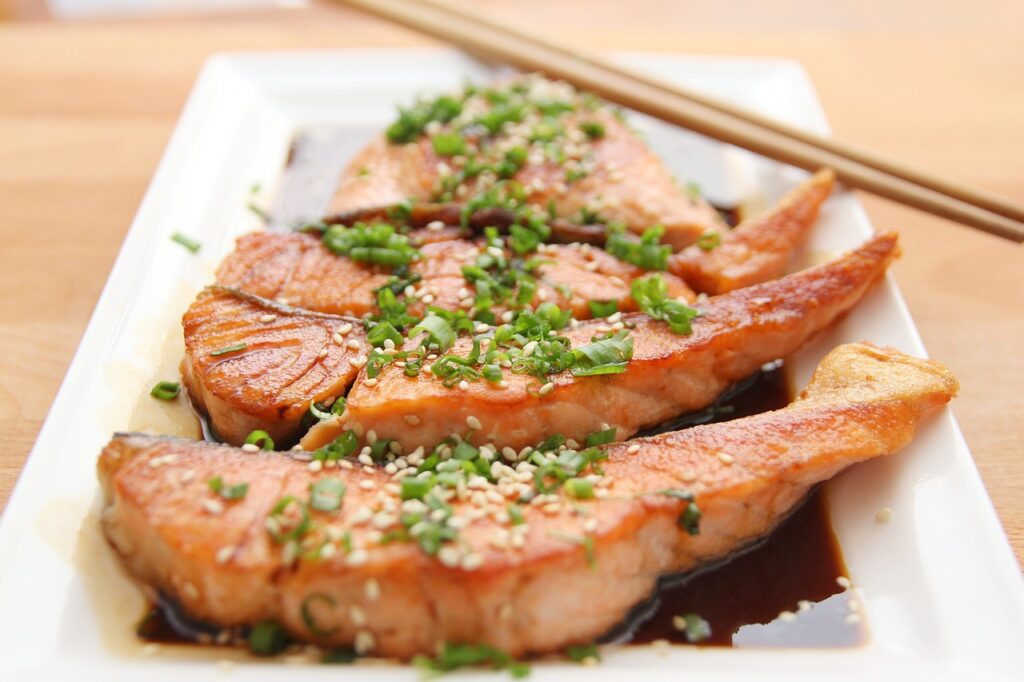
Mercury Content in Salmon: What to Be Aware of
When choosing your diet during pregnancy, it’s important to consider the presence of mercury in fish, including salmon. Mercury is a naturally occurring heavy metal that can enter aquatic ecosystems. While salmon is generally considered a safe seafood choice for pregnant women, understanding the mercury levels in different types of salmon and how to minimize exposure is crucial.
Mercury and Its Impact on Pregnancy
Exposure to mercury during pregnancy can pose risks to the developing baby. High levels of mercury can harm the developing nervous system of the infant, leading to developmental delays and cognitive impairments. In early pregnancy, the baby’s nervous system is rapidly developing, making vigilance regarding mercury exposure especially important.
Mercury Levels in Different Types of Salmon
Wild-Caught Salmon: Generally, wild-caught salmon, including species like sockeye and pink salmon, tend to have lower mercury levels compared to certain farmed varieties. This is because wild salmon feed on a natural diet, which typically results in lower mercury content.
Farmed Salmon: On the other hand, farmed salmon may have slightly higher mercury levels due to variations in their diet. However, it’s worth noting that even farmed salmon typically have mercury levels well below the safety thresholds set by regulatory agencies.
Therefore, if you’re concerned about mercury levels, opt for wild-caught salmon. These species usually have lower mercury levels while providing the same nutritional value. Additionally, monitoring your portion size and consuming salmon in moderation can help reduce mercury intake while still delivering essential nutrients.
As a side note, fish known to have high mercury content include shark, swordfish, king mackerel, and tilefish. These should be removed from your menu during pregnancy.
Exploring Pregnancy-Safe Seafood Choices
While salmon is a popular and nutritious seafood choice during pregnancy, diversifying your seafood intake can provide a wider range of essential nutrients. Explore seafood choices that are generally considered safe during pregnancy, allowing you to enjoy a well-rounded diet that supports both your health and the optimal development of your growing baby. Here’s a detailed overview of some seafood choices typically considered safe during pregnancy:
1.Shrimp:
Shrimp is a low-calorie, protein-rich seafood option that’s typically safe during pregnancy. It’s also a good source of iodine, which is important for your baby’s brain development.
2.Tilapia:
Tilapia is a mild and versatile fish that’s low in mercury and safe to eat during pregnancy. It provides a good amount of protein and essential nutrients like B vitamins and selenium.
3.Cod:
Cod is a lean, white fish that’s low in mercury and a good source of protein. It’s often used in various culinary preparations and can be a valuable addition to your diet during pregnancy.
4.Pollock:
Pollock is another mild white fish that’s generally low in mercury and rich in protein. It’s commonly used in fish sticks and processed seafood products.
5.Catfish:
Catfish is a freshwater fish that is typically low in mercury and provides a healthy dose of protein. It’s often used in Southern cuisine and can be enjoyed in various dishes.
6.Haddock:
Haddock is a white fish that’s similar to cod and known for its mild flavor. It’s low in mercury and can be used in a variety of recipes.
7.Sardines (Canned):
Canned sardines are a rich source of omega-3 fatty acids, calcium, and vitamin D. They are low in mercury and provide essential nutrients that support both your health and your baby’s development.
8.Trout:
Trout is a freshwater fish that’s generally low in mercury. It’s rich in protein, omega-3 fatty acids, and essential vitamins and minerals.
9.Anchovies:
Canned or fresh anchovies are a concentrated source of omega-3 fatty acids, calcium, and iron. They are low in mercury and can be used in salads, sauces, or as a pizza topping.
10.Mussels:
– Mussels are a nutrient-rich shellfish that’s a good source of protein, iron, and essential vitamins and minerals. They are generally considered safe during pregnancy.
11.Oysters:
– Oysters are rich in zinc, iron, and vitamin B12. They are typically safe to consume when cooked thoroughly, reducing the risk of foodborne illnesses.
12.Scallop:
– Scallops are low in mercury and provide protein, vitamin B12, and magnesium. They can be grilled, sautéed, or used in pasta dishes.
Remember that while these seafood choices are generally considered safe during pregnancy, it’s important to practice safe food handling and cooking techniques to minimize the risk of foodborne illnesses. Always ensure that seafood is properly cooked and sourced from reputable suppliers.
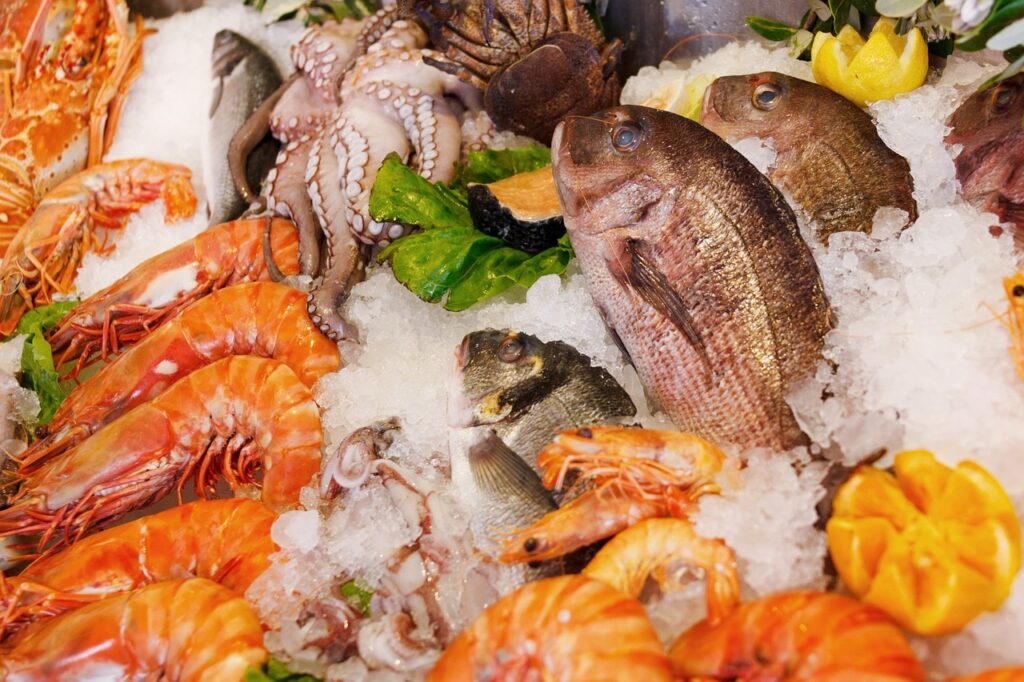
Conclusion: Making Wise Choices During Pregnancy
In summary, as long as you follow safety guidelines, consuming salmon during pregnancy can be a healthy choice. By understanding the nutritional value of salmon, thoroughly cooking it, and being mindful of potential risks, you can enjoy this nutritious fish without compromising your health or your baby’s development.
FAQ Section
Q1: Can I eat canned salmon during pregnancy?
Yes, canned salmon is typically safe during pregnancy. It’s a convenient and affordable option that offers similar nutritional benefits as fresh or frozen salmon. However, be sure to check the label for additives and choose varieties with lower sodium content.
Q2: Are there any side effects of eating too much salmon during pregnancy?
While salmon is nutritionally rich, overconsumption can lead to mercury exposure. Monitoring portion sizes and selecting salmon with lower mercury levels (such as wild-caught salmon) is crucial.
Q3: Can I eat salmon roe (fish roe) during pregnancy?
It’s best to avoid consuming salmon roe (fish roe) during pregnancy due to the potential risk of bacterial contamination. Cooked salmon preparations are a safer choice over raw or semi-raw options.
Q4: What are alternative sources of omega-3 fatty acids for pregnant women?
If you’re concerned about consuming salmon, you can obtain omega-3 fatty acids from sources like flaxseeds, chia seeds, walnuts, and fish oil supplements specifically formulated for pregnant women. Consult your healthcare provider for personalized recommendations.
Q5: How often should I incorporate salmon into my pregnancy diet?
Moderation is key. Aim to have 2-3 servings of low-mercury fish, including salmon, per week. This balance allows you to enjoy the nutritional benefits while minimizing potential risks.







